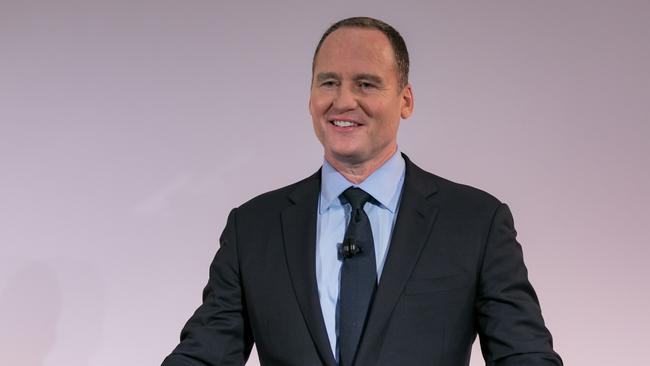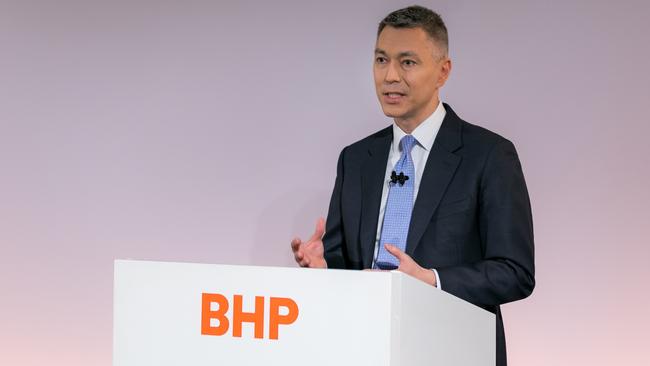BHP confirms China is deferring Australian coal imports
One of Australia’s biggest miners has confirmed China is turning its back on Aussie coal, in a move that could hurt the nation’s COVID recovery.

Mining giant BHP has confirmed China is deferring shipments of Australian coal, saying it is concerned about the impact the trade tensions will have on post-pandemic economic recovery.
The Federal Government said on Tuesday it was looking into reports Chinese buyers had been told to stop importing Australian coal and on Wednesday, BHP suggested it had seen evidence.
“Our commercial team has recently received deferment requests from some of our Chinese customers,” chairman Ken MacKenzie told reporters after the company’s first virtual annual general meeting.
“The good thing about our portfolio is we’ve got fantastic products — iron ore, metallurgical coal, copper, oil and gas — that are well positioned geographically, that are well positioned on the cost curve, that are at the higher end of the quality spectrum and not easily displaceable, not readily available around the world.
“So that’s what helps us.
“We do a lot of scenario planning around this.
“I don’t think we’re as concerned about the trade barrier implications for our product, notwithstanding the energy coal imports in China right now.
“Our concern around some of these geopolitical tensions and trade wars that are going on is the impact it could have on global growth and in a post-COVID world, that probably has even more concern.”
BHP revealed in August it seeks to exit certain coal assets – its BMC mines in Queensland, Mt Arthur mine in the Hunter Valley and Cerrejon operation in Columbia – to concentrate its coal portfolio on higher-quality coking coals as steelmakers seek to improve blast furnace utilisation and reduce emissions intensity.
Many of the questions Mr MacKenzie and chief executive Mike Henry fielded during the AGM related to climate change, including why the company continues to invest in petroleum, and while it has a net zero emissions by 2050 target, it believes fossil fuels still have a role for some time to come.
“We accept the science around climate change ... but petroleum is going to be part of the energy mix for decades,” Mr MacKenzie said.

BHP was also grilled on Indigenous engagement, a day after sealing an 11th hour agreement with the First Nations Heritage Protection Alliance to withdraw a resolution proposing a moratorium on activities that would disturb, destroy or desecrate cultural heritage sites in Australia, to be reviewed annually by the board.
The resolution also proposed a commitment to not enforce any contractual or other provisions that limit the ability of traditional owners to speak publicly about cultural heritage concerns on their land.
The mining giant said the parties had instead agreed on “a path forward to enhance the influence and voice of traditional owners in relation to heritage protection”.
“We have determined a set of shared principles around Aboriginal heritage in Australia which reaffirm BHP’s commitment to free, prior and informed consent in agreement making,” a statement read.
“Together we agree regulatory regimes should respect and reflect these rights.”
The alliance was formed in response to Rio Tinto’s Juukan Gorge debacle, which saw two 46,000-year-old caves containing Indigenous artefacts in Western Australia blown up to recover $135 million worth of iron ore as part of the Brockman 4 mine expansion.
The destruction sparked worldwide outrage and is being investigated by a parliamentary inquiry.

Mr MacKenzie said relationships with traditional owners were among the most important BHP has and “recent industry events only reinforce that view”.
“Strong partnerships with Indigenous peoples are essential for BHP’s business,” Mr MacKenzie said.
“BHP strongly supports the updating of Australia’s cultural heritage laws in ways that give proper consideration and respect to traditional owners’ views.
“Juukan Gorge was a tragedy, it was a loss of unique cultural heritage but it was also a loss of trust and it’s had an impact across the industry as a whole so we’ve listened to Indigenous leaders.”
After the cave destruction, BHP promised to not disturb 40 ancient sites to enlarge its $4.5 billion South Flank iron ore project in WA without consulting traditional owners.
It is legally allowed to disturb them after successfully lodging an application under a section of the state’s Aboriginal cultural heritage bill that enabled the Juukan Gorge blast to happen.
The state government hopes to pass its new version of bill this year, which will provide for agreements between traditional owners and companies to consider new information and be amended by mutual consent.
Mr MacKenzie said BHP operated a level higher than the legislation – only disturbing 50 per cent of the sites it is allowed to – and says there is so far no change to the South Flank project schedule.
The meeting for investors holding Australian-listed shares saw directors from the UK, Switzerland, the US and Australia take part via video while another will be held on Thursday for those holding BHP’s London-listed stock, with the results of votes on 24 resolutions not known until after the second event.


